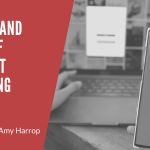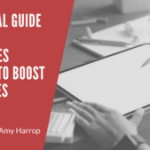 Very few authors make a fortune from book sales.
Very few authors make a fortune from book sales.
Actually, that’s not true: not even a small percentage of published authors make a living from their royalties. And those are the writers who have book deals. That begs the question: why do so many people dip their toe into publishing every year, whether that’s with a big-name press or as a self-publishing author? The short answer: while most authors are unlikely to retire on royalties, a book can be an invaluable tool to support your other businesses.
In this post, we’ll talk specifically about non-fiction publishing and show you how authors are using their books as a powerful tool for selling their products and services.
Note: This is the point where many entrepreneurs will say, “But I’m not a writer.” If you’re one of those people, we have one word for you: Ghostwriting.
What ‘need’ does your product fill (and for whom)?
This is the first question any entrepreneur needs to answer: where is there a gap in the market, and how does your product fill that gap? Another way to look at it is to ask, ‘what problem am I solving?’
If you’re selling bicycles, maybe they have a safety feature that makes it less hazardous to ride in a busy city? If that’s the case, then that takes care of another question: who is my target consumer?
If you’ve developed new accounting software, maybe it helps small business owners handle their taxes by themselves — and will save them thousands in accounting fees.
If you’ve managed to identify answers to those two questions (what problem do you solve? And for whom?), then you’re halfway to an idea for a book that can help you sell that product.
How else can you help them solve this problem?
A big mistake would be to write a book that’s all about how great your product is. People don’t want to read a 200-page sales pamphlet. Your aim should be to write a book that helps to solve a problem that your target audience has.
If you’re that business with the accounting software – why not write a book that contains your insights and tips for handling small business taxes? If you’re selling those safe bikes, perhaps your book is about cycle safety or a directory of cycling routes? You want to connect with your target customer, make them more aware of the problem that your product will eventually solve, and offer them solutions.
These solutions should not involve them buying something from you: that will come later. Now is the time to get to let your customer become aware of you and to earn their trust: and nothing betrays trust quicker than a hard sell.
“Get out of my book (and into my mailing list)”
Once a prospective customer has read your book, learned to love it, and sees you as an authority in your field — it’s critical to get them into your business’s ecosystem. One of the best ways to do this is with a lead magnet (or a reader magnet, as they’re called in publishing).
Somewhere in the book, tell readers that they can go to your website and download extra content for free. This might be a worksheet, a template, a webinar, or an additional book. So long as this content is of value to the reader, they will be happy to sign up to your mailing list in exchange.
Treat these customers well
At this point, if you’ve done everything right, the people on your mailing list who have read your book and downloaded the extra content will be ‘hot leads’ — customers primed to purchase your product or service with just a little nudge.
You can set up an email automation that will send new subscribers a few useful pieces of content before finally dropping your sales email.
Be sure to take care of these leads: as folks who have bought into your brand, they’re also more likely to evangelize on your behalf. Offer them discounts or bonuses that are exclusive to them; be sure to answer their emails promptly; give them discount codes to share with their contacts.
Also, remember to engage them through your newsletters regularly. Be careful not to spam them, though: keep your newsletters relevant, and always be sure to offer them free content that’s of value to them. Then when the time comes to sell them your next product, they’re ready to hand over their hard-earned cash.
And we haven’t even touched on how authoring a book will give you a platform and allow you to secure publicity opportunities like conference appearances and guest posts. In short: if you go about it the right way, your book will become your company’s marketing Swiss Army Knife, and you’ll wonder how you ever lived without one.
Martin Cavannagh is a writer and a member of the team at Reedsy. The world’s largest marketplace of experienced publishing professionals, Reedsy has helped thousands of authors create great books work with the help of top editors, marketers, and ghostwriters.



